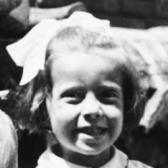
-
Learn More about Theodora
Theodora (Dora) Klayman was born Teodora Rahela Basch in Zagreb, Yugoslavia, on January 31, 1938. Her father, Salamon, owned and operated a small brush manufacturing plant. Her mother, Silva, a teacher, grew up in Ludbreg, a small town in northwest Croatia, where her father, Josef Leopold Deutsch, served as the community rabbi for more than 40 years.
In April 1941, while Teodora—whom the family called “Dorica”—was visiting her grandparents and extended family in Ludbreg, Nazi Germany invaded Yugoslavia. Croatia came under the control of the fascist Ustaša regime, which collaborated with the Nazis. By June, Teodora’s parents and infant brother, Zdravko, were arrested. Their housekeeper was able to get Zdravko released from jail and his mother’s family then took him to Ludbreg. Teodora and Zdravko’s father was deported to the Jasenovac concentration camp and their mother to Stara Gradiska, a subcamp of Jasenovac.
In Ludbreg, Teodora and Zdravko were first sheltered by their grandparents, but by 1942, nearly the entire Jewish community of Ludbreg had been deported, including their grandparents and their mother’s sister Blanka Apler and her family. All were soon killed in Jasenovac. Teodora and Zdravko were left behind with their mother’s sister Gizela (Giza) Vrančić and her Catholic husband, Ljudevit (Ludva).
In order to avoid arrest, Teodora and Zdravko were frequently taken by train, often with little warning, to a nearby town and at other times they would spend a few days with different neighbors. Sometimes they would not be allowed to leave the house for fear of attracting the attention of the occupying Ustaša forces. During the fierce battles that often raged in Ludbreg between the Ustaša and the partisans, they would spend nights in their cellar or cower in the corners of the living room as bullets pierced the windows and lodged in the furniture. When the partisans prevailed, Teodora and Zdravko would be free of danger and fear and allowed to move around the town freely, but these periods of relative safety were short.
Eventually, Ljudevit was arrested on suspicion of supporting the partisan resistance movement. He was sent to Jasenovac, where he saw Teodora and Zdravko’s father, who was still alive despite having little food and being forced to perform heavy labor. Ljudevit was eventually released along with other political prisoners.
By 1943, Ljudevit’s wife, Gizela, was denounced, arrested, and deported to Auschwitz. Not knowing where she had been sent, Ljudevit travelled to several cities and tried in vain to have her released; she died from an intestinal illness soon after her arrival at Auschwitz. While Ljudevit was away, Teodora and Zdravko hid with their neighbors, the Runjaks, and pretended to be their children. Most people in Ludbreg knew the children were Jewish, but they never denounced them.
After liberation, Ljudevit, realizing that Teodora and Zdravko’s parents had been killed, legally adopted the children. Sadly, Zdravko died of scarlet fever soon after. Teodora remained with her uncle, attending high school in Varazdin and then the University of Zagreb. In 1957, she was invited to live in Switzerland with her paternal uncle, Josef Basch, and his family so she could study at the University of Lausanne.
On her way to Switzerland, Teodora met Daniel Klayman, a Jewish American research chemist who was en route to his native New York after a year spent as a postdoctoral Fulbright scholar in India. After corresponding with Teodora for a year, Daniel returned to Switzerland and the two married in the fall of 1958. Later they settled in the Washington, DC, area.
The recipient of degrees from the University of Maryland in French and in teaching English as a second language, Teodora—now Theodora Klayman—taught in the Maryland public school system for 30 years. She has two children and has volunteered at the United States Holocaust Memorial Museum since 1999.






